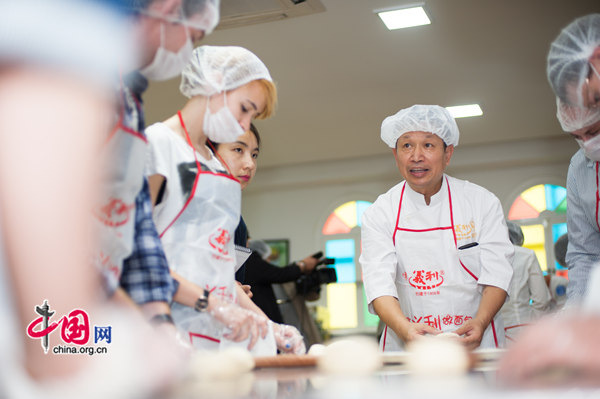Century-old bread mill confident in differentiation strategy
- By Chen Boyuan
 0 Comment(s)
0 Comment(s) Print
Print E-mail China.org.cn, September 29, 2014
E-mail China.org.cn, September 29, 2014
|
Zhang Chunlin, chief bread master of Yili Bread Company in Beijing teaches a group of international people how to make stuffed bread on Sunday, Sept. 28, 2014. The guided tour in Yili Bread is the latest "Experience Beijing," a series of activities organized by the Beijing Municipal Government in a bid to promote Beijing's local culture to foreigners. [Photo by Chen Boyuan / China.org.cn] |
Yili Bread, a time-honored Beijing brand, expressed confidence that its marketing strategy of differentiation can keep this century-old factory alive and prosperous.
Established in 1906 by Scottish businessman James Neil, the factory takes pride in its Vitamin Bread and Fruit Bread, two flagship products popular among Beijing locals. Many local residents say they grew up having the two kinds of bread on their breakfast tables.
Zhang Chunlin, Chief Bread Master at the factory, told a guided group of around 50 foreigners living and working in Beijing that the secret behind the brand's success was the company's adherence to the "constant flavor" and the company's attention to quality and food safety.
"I have seen elderly people lining up at our shops in downtown areas in the morning just to buy our fresh Fruit Bread. That kind of customer loyalty isn't seen very often these days," said Zhang.
An influx of French-style bakeries, such as Weidomé and Auspicious Phoenix, have had an obvious impact on Yili, as many young people have either switched to other fancier breads or have never heard of Yili at all.
"I grew up eating Yili bread, and so did my parents, but my classmates who are from other places don't seem to like Yili. They think Yili's flavor is too plain and its packaging too outdated," said Liu Qianmou, a 20-year-old local college student. She thinks the best and the worst thing about Yili's bread is that it is "not too oily."
"Those who had Yili Bread when they were young are more prone to continue with the habit, while those who did not, such as newcomers to the city, aren't really going to like its taste," said Liu, offering her conclusion about the bread's future.
But Yili's chief bread master did not agree with Liu's assertion. He said that the factory's production of 40 tons of bread-around 165,000 loaves-each day is proof of the company's continued success.
"We don't have to compete with those trendy French bakeries; we have our own target customers," said Zhang, implying that developing its own products in addition to maintaining its brand culture, instead of launching a head-on battle with French-style bakeries in Beijing, will be the future of the century-old bread factory.
Zhang also said Yili is already a part of the tradition and culture held in the hearts of Beijing's people, and he believes that the older generation's brand loyalty will be passed on to younger generations.







Go to Forum >>0 Comment(s)